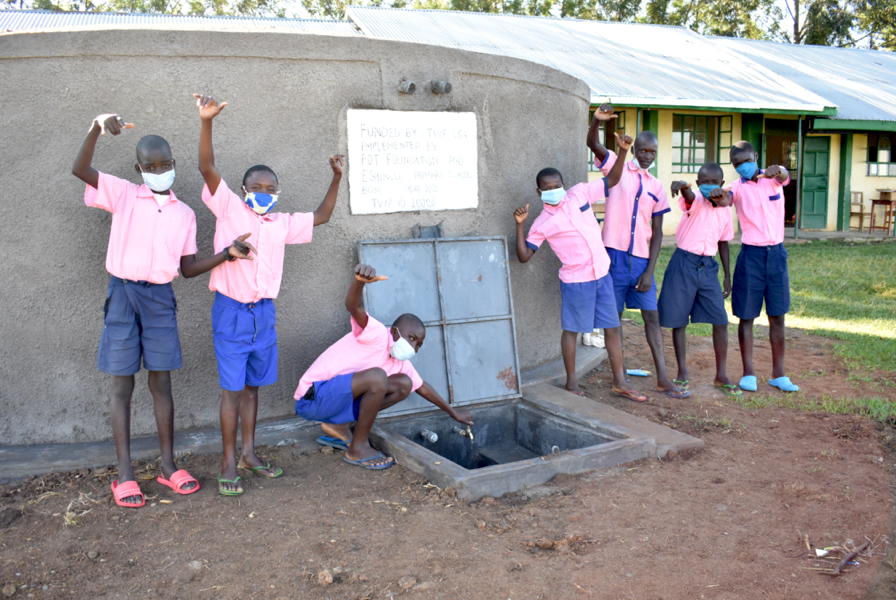6 Proven Benefits of Giving

Studies show that individuals are giving more now than in recent years (as opposed to corporate giving, which fell in 2020 for some mysterious reason). Maybe hours of helpless doom-scrolling have stirred people to action. And if you’ve landed here, then you’re probably already thinking about portioning out some of your hard-earned funds toward causes you care about.
As Giving Tuesday approaches, I’m here to push you over that ledge into full-on generosity, whether you end up giving to The Water Project or some other organization bettering the world.
#1—Giving makes us happier and healthier
The warm glow that permeates us when we buy something for ourselves fades quickly. But giving to charity is both a long-term investment in someone else’s future and a happiness boost for yourself. A 2006 study showed that giving to a charity releases happiness chemicals, like oxytocin and endorphins, in our brains.
But that’s just the short-term, you say. How long can that last—a few hours? Not so.
A 2020 study shows that prosocial behavior (action intended to help other people) can significantly reduce symptoms of anxiety and depression, especially if someone regularly gives their time or money to others. Further research concluded that people who give money generously have lower blood pressure on average. And yet another neurological study showed that there is generally a definitive link between generosity and happiness.
So, the conclusion? Money can buy happiness…but only if you spend it on others.

Photo by Anete Lusina from Pexels.
#2—Giving fights helplessness
“Learned helplessness” is a term used by psychology professionals to describe an aspect of depression wherein people believe that there is no way out of their unfortunate situation. Even if presented with solutions, a person with learned helplessness will say that attempting to fix the problem is useless. Learned helplessness can happen to anyone: it’s a response to repeated stressors. If this way of thinking overtakes someone’s mind, they’re much more likely to develop depression later in life.
So, you’re watching the news. You find yourself enraged at politicians who aren’t acting in the people’s best interest but know the system is corrupt, and nothing’s going to change that. Or you pass a homeless person and wish you could help them, but have been told not to give them money, so you shrug and carry on with your day, a little sadder. You watch a devastating climate change video. You scroll past a story about an abused animal.
“But I can’t help” is usually the thought that comes after any of these occurrences. Except, you can. Even if your donation is small. Even if you can only donate to one cause.
Giving money to a reputable non-profit working for a cause you’re passionate about is putting your vote for change into the universe. And, if you’ll allow me to be a little blunt for a moment, if you’re reading this, you’re probably more affluent than a staggering percentage of the global population.
You have the power to do something to better the world.
#3—Giving opens our psyches to gratitude
Exposing yourself to others’ trying experiences can be painful. Many people choose, instead, to ignore crises in their communities and across the globe. Don’t get me wrong; I’m not blaming these people. Sometimes, the pain of the world can feel like an intolerable burden. It can be easier to look away, especially if you’re in pain yourself.
But, conversely, looking at your own life through the lens of someone who lacks the resources that you take for granted can cultivate a sense of gratitude for your own life as it is now. The items you covet in others’ hands may not improve your life past the day you acquire them, and purchasing things on impulse is frequently a detriment to more long-term goals.
Consider, instead, setting that money aside for someone else. Reminding yourself of your privilege isn’t generally the most fun activity, but the resulting gratitude after you extend a helping hand most definitely is. Practicing gratitude for the things you already have can benefit your health and contribute to a continuous cycle of giving and feeling good.

#4—Giving can give you purpose
Something about a global pandemic can put your own life in perspective. People in my social circle experienced existential crises when they weren’t labeled as “essential” workers last year. Some had crises, even if they were essential. “Wait, am I essential? What am I really contributing?”
But if you’re giving your time or resources to others (even if it’s just in little ways), you’re making the world better. The subsequent sense of usefulness has been known to help us live longer well into retirement.
#5—Taxes
Okay, it’s a little more work than just filing taxes (you’ve got to track your donations and itemize them). But if you have enough funds to give more than your usual tax refund, you can get much of the money you donate to charities back once tax season rolls around. There are some caveats to this, including whether an organization is tax-exempt (although most are!).

#6—Generosity is contagious
If you tell others about your gift or share posts about it on social media, you can influence other people to do the same. And it’s not just me saying this, either: science has studied this effect with definitive results. With this principle in mind, it’s easy to imagine how even the smallest gifts can impact a cause. If someone who follows your social media admires you (and why wouldn’t they?), they might follow in your footsteps and give themselves.
So, don’t go shouting from the rooftops about how generous you are or anything – that will defeat the purpose. But it’s pretty hard to dislike someone who parts with their own money on someone else’s behalf.
Conclusion:
Go forth and be generous.
Home More Like ThisTweet